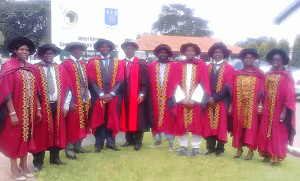AGRA’s sponsored students graduate with PhD

Ten West African students sponsored by the Alliance for Green Revolution in Africa (AGRA) have graduated with Doctor of Philosophy (PhD) degrees in Plant Breeding at the West Africa Centre for Crop Improvement (WACCI), University of Ghana.
They include Dr Joseph Adjabeng Danquah, Dr Ernest Baafi, Dr Liliane Tandzi Ngounge Dr Oumarou Souleymane, Dr Nasser Laouali Mahamane, Dr Joseph Teyloue Benoit Batieno, Dr Alice Jelimo Kosgel, Dr Kenneth Fafa Egbadzor, Dr Apala Hortense Mafouasson and Dr Mohammad Lawan Umar.
The graduates are from six African countries namely Ghana, Burkina Faso, Nigeria, Cameroon, Kenya and Niger.
The graduates, who specialized in plant breeding in Africa, were part of the post-graduate students of the University of Ghana, who graduated at a congregation held in Accra, on Friday.
Professor Eric Yirenkyi Danquah, Director of WACCI, said the centre was established at the University of Ghana in June 2007, with funding from the AGRA to train 40 students in plant breeders in the West African sub-region at the PhD level.
He said the funding is a ten-year programme, due to end in 2017, expressing the hope for possible extension.
He said the graduates are expected to use the knowledge acquired to develop new crops at their various countries in ensuring food security and meet nutritional needs.
Prof Danquah said WACCI was conceived from a partnership between the University of Ghana and the Cornell University based on the model of the African Centre for Crop Improvement and the University of KwaZulu-Natal in South Africa.
He said the idea was to build capacity for plant breeders working on African crops.
The WACCI is one of the two institutions in Africa where AGRA initiated doctoral training programmes for African crop breeders with the aim of strengthening Africa’s seed systems.
Prof Danquah said the Centre is to promote student exchange programme, where students travel across the African terrain to learn first-hand on practical experiences of other countries in plant breeding to enhance cross country discourse.
Prof Danquah called for the development of human capacity in the country and invest in Agriculture, as Brazil did to improve crop varieties and appealed to government to allocate 10 per cent of the country’s budget to Agriculture.
He said the need to establish the centre came as a result of Africa’s lack of capacity to develop improved varieties, necessary to bolster its food security, due to the inadequate financial investment and scarcity of well-trained plant breeders.
Prof Danquah said the WACCI’s programme involves two years of course work plus three years of field research, adding that, the first year course work included plant genetics, crop improvement, biometry, quantitative genetics, molecular genetics and biotechnology in plant breeding, plant microbial interactions and disease control and plant stress physiology.
Dr Rufaro M.Madakadze, Programme Officer in charge of Education and Training at AGRA, said the programme had so far graduated 28 PhD students in three years.
She said there has been a great improvement in plant breeding within the respective countries that have benefited from the scholarship because the students were equipped with the needed knowledge in crop improvement.
Some of the students who spoke with the GNA expressed satisfaction about the programme, saying that, they have been able to come out with new promising crop varieties that would improve Agriculture in Africa.
Source: GNA
